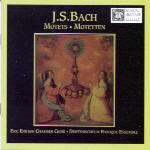Bach’s motets contain some of his most difficult, and in the case of one in particular (Jesu, meine Freude), grandest choral music. They test the practical limits of any chamber choir’s technique, being totally unrelieved in texture by either solo arias or instrumental interludes. The fact that instruments may double the voices (some groups opt for a cappella readings or use only continuo support) offers some assistance with regard to pitch, but this is small consolation when you’re standing in the middle of a mass of eight-part counterpoint trying to figure out where you stand in Bach’s overall scheme of things.
These performances get through the notes well enough, but not without a lack of confidence, particularly in the upper voices, which manifests itself in a certain shrillness and unsteadiness in exposed passages for reduced forces (once again I am thinking of Jesu, meine Freude). Eric Ericson’s direction also misses some of the dynamic variety and contrast within the individual works and from one to the next. The original EMI recording makes the choir sound much murkier than I suspect it does in person, and therefore muddies Bach’s crystal clear polyphony. In short, you can do much better with any of the reference editions listed below.
































